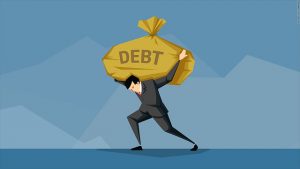What planning and help do you need to be debt free in the next few months?

Imagine living your life debt free. Imagine being able to walk into any store and buy whatever you want, whenever you want without the guilt. Now imagine being able to finally put investment plans into place to build wealth for a secure future without having to worry about paying off the dangerously, unhealthy, growing interest on your credit card, which only continues to spiral out of control.
This is a dream that has started to fade for many Singaporeans due to many factors. For some, the Government has signified the need to reassess and re-evaluate strategies in minimising personal debt, in particular credit card debt, before the new financial year starts.
Any reformed debt-aholic would tell you that living debt free is indeed one of the most beautiful feelings in the world.
Table of Contents
Being debt free is a feeling of accomplishment coupled with a sense of achievement and satisfaction that stems from knowing you are finally free to use your money in any way you desire and simply because you were able to follow the following six steps:
- Establish a budget. By budgeting you can find extra money to pay your account in full every month or at least enough money to pay more than the minimum repayment. A budget will also allow you to plan ahead for your bills.
- Stop borrowing money or accumulating any more debt as soon as possible.
- Know your cards intimately. Understand exactly how much interest you’re paying on each of your credit cards and only keep one card for emergencies, example a broken-down car.
- Use excess cash. Eliminate your credit card debt in the quickest way possible. You need to put all your excess cash into the debt that has the highest interest rate first.
- Use cash instead of credit. People often spend more when using a credit card instead of cash for purchases, as it makes you think twice about impulse buying.
- Find a better rate on your existing credit cards. No matter how much debt you have, compare balance transfer credit cards to get the lowest rate and pay your debt off sooner.
The simple fact is if you continue to owe money, you can’t be debt free.
Examine the Reasons Behind Your Crisis of too much debt. Solving financial problems requires that you understand the underlying cause of the crisis. Examine the reasons objectively. If you have health issues, loss of employment, or have sustained damages from a natural disaster, there are agencies that can help you. Do some research and don’t be afraid or embarrassed to ask for help. If your money problems are a result of poor management or overspending, don’t berate yourself. Maintaining your self-esteem and a positive attitude will enable you to make good rational decisions so you can work your way out of debt.
Analyse and Categorise Your Debts. Debts fall into two categories, secured and unsecured. Secured liabilities are guaranteed by property, either real or personal. A mortgage is a secured debt. An motorcar loan is a secured debt. Credit card balances are the most common example of unsecured debt. List all your debts and determine which category each of your debts falls under.
Prioritize your payments. When you are in a financial crisis, the payment order for your bills should be determined by their importance in sustaining and maintaining your life. Keep in mind that, if you don’t make the payments on a secured debt, the creditor can ultimately take control of the property used for collateral on the loan.
Increase income to overcome too much debt. There are a number of ways to increase income. A second job may provide the extra funds needed to improve your financial status. However, take into consideration the expenses that may be associated with working longer hours, such as childcare and transportation. Selling personal property is another option that may help you overcome a financial crisis. Just be sure to get the fair market value of the property and don’t part with items that will cause you emotional distress.
Cut Expenses. If you are in too much debt, look for ways to reduce the amount you pay out each month. Trimming the fat from your budget requires diligence and sacrifice. Pack a lunch, use grocery store vouchers, and search out free entertainment. Learning to save and live more frugally can be a giant step towards financial stability.
Consolidate with Care. If you are a private homeowner, you may be able to qualify for an equity loan to consolidate your bills into one easier-to-manage payment. Remember that a home equity loan means that you are tapping into the cash value of your house. There are many different types of home equity loans, but before you sign on the dotted line, check out the lenders and make sure the one you work with is reputable. A consolidation loan can be a permanent solution to your money woes, but you must have the discipline to cut up your credit cards and change your spending habits.
Credit Counselling is needed when you have too much debt. A reputable credit-counseling service, such as Credit Counselling Singapore, can be a viable solution for long-term financial problems. In addition to providing valuable financial education, they also offer workable debt management plans. This is not a quick fix. However, it is one of the most sensible ways to get out of debt and stay out of debt.
However living within your means, setting a budget, paying cash and finding better interest rate terms on your credit cards will have your dreams of being debt free, turning to reality before the new financial year.






